高考英语反意疑问句讲解及练习
反义疑问句句知识点+习题

反义疑问句一、学习反意疑问句,特别要注意的问题1)陈述部分的主语是this, that时,疑问部分的主语多用it;陈述部分的主语是these, those时,疑问部分的主语多用they如:This is a dictionary, isn’t it?Those are shelves, aren’t they?2)陈述句如果是there be结构时,疑问句部分仍用there。
如:There once was a man named Saint Nicholas, wasn’t there?3)在英语口语中,“I am +表语结构”,后面的反意疑问句多用aren’t I来体现。
如:I am very interested in learning English, aren’t I?4)陈述句的主语是动词不定式,动词的-ing形式或从句时,疑问部分的主语多用it来体现。
如:Taking care of our environment is very important, isn’t it?What he said is right, isn’t it?5)陈述句中含有not, no, hardly, neither, never, few, little, too …to等否定词或具有否定意义的词时,疑问部分常用肯定形式。
如:Few people knew the news, did they?Tom has never been to England , has he?但陈述句中如果带有否定意义的前缀和后缀的单词时,整个句子仍视为肯定句,反意疑问部分多用否定形式。
如:She is unhappy, isn’t she?6)陈述句的主语是nobody, no one, everyone, somebody等不定代词时,反意疑问部分的主语多用they (当强调全体时)或he(当强调个体时)。
如果陈述句的主语是something, nothing, anything, everything 等不定代词时,反意疑问部分的主语多用it。
反义疑问句讲解及习题及答案

知识梳理句型解释1.陈述部分肯定式+疑问部分否定式可记为前肯后否2.陈述部分否定式+疑问部分肯定式可记为前否后肯主语一般词语附加疑问句中主语用和主语一致的主语,用主格。
不定代词当陈述部分的主语是( 1 )用one 时,后面的疑问句可用one/he.(2)everything,anything,nothing,something时,附加疑问句中主语用it 不用they(3)this,that,或those,these时,附加疑问句中主语用it和they.(4)everyone,everybody,someone,somebody等,附加疑问句中主语一般用he/they.(5)不定式,动名词,其他短语,附加疑问句中主语一般用it。
(6)在there be句型中,附加疑问句中主语一般用be/情态动词/助动词+there。
特殊句型否定意义的词否定意义的词(1)当陈述部分有never,seldom, hardly,few,little,barely, scarcely, nothing 等否定意义的词时,后面的反意疑问句则为肯定形式:There are few apples in the basket, are there?He can hardly swim, can he?They seldom come late, do they?(2)当陈述部分含有否定意思的词是unhappy,dislike,unfriendly等含有否定词缀的派生词,也就是有un-前缀、-less后缀等含有词缀而意思否定的词,当做肯定句处理,疑问部分要用否定形式。
如:He looks unhappy,doesn't he?他看上去不高兴,不是吗?The girl dislikes history,doesn't she?这女孩不喜欢历史,不是吗?有less,fewer等词视为肯定词,疑问部分用否定形式。
如:There will be less pollution, won't there?表示主语主观意愿的词含有think, believe, suppose, imagine, expect等动词后接宾语从句构成的主从复合句在构成反意疑问句时,视情况不同有两种不同的构成方式。
反义疑问句讲解及习题及答案

知识梳理句型解释1.陈述部分肯定式+疑问部分否定式可记为前肯后否2.陈述部分否定式+疑问部分肯定式可记为前否后肯主语一般词语附加疑问句中主语用和主语一致的主语,用主格。
不定代词当陈述部分的主语是( 1 )用one 时,后面的疑问句可用one/he.(2)everything,anything,nothing,something时,附加疑问句中主语用it 不用they(3)this,that,或those,these时,附加疑问句中主语用it和they.(4)everyone,everybody,someone,somebody等,附加疑问句中主语一般用he/they.(5)不定式,动名词,其他短语,附加疑问句中主语一般用it。
(6)在there be句型中,附加疑问句中主语一般用be/情态动词/助动词+there。
特殊句型否定意义的词否定意义的词(1)当陈述部分有never,seldom, hardly,few,little,barely, scarcely, nothing 等否定意义的词时,后面的反意疑问句则为肯定形式:There are few apples in the basket, are thereHe can hardly swim, can heThey seldom come late, do they(2)当陈述部分含有否定意思的词是unhappy,dislike,unfriendly等含有否定词缀的派生词,也就是有un-前缀、-less后缀等含有词缀而意思否定的词,当做肯定句处理,疑问部分要用否定形式。
如:He looks unhappy,doesn't he他看上去不高兴,不是吗?The girl dislikes history,doesn't she这女孩不喜欢历史,不是吗?有less,fewer等词视为肯定词,疑问部分用否定形式。
如:There will be less pollution, won't there表示主语主观意愿的词含有think, believe, suppose, imagine, expect等动词后接宾语从句构成的主从复合句在构成反意疑问句时,视情况不同有两种不同的构成方式。
反义疑问句讲解及答案
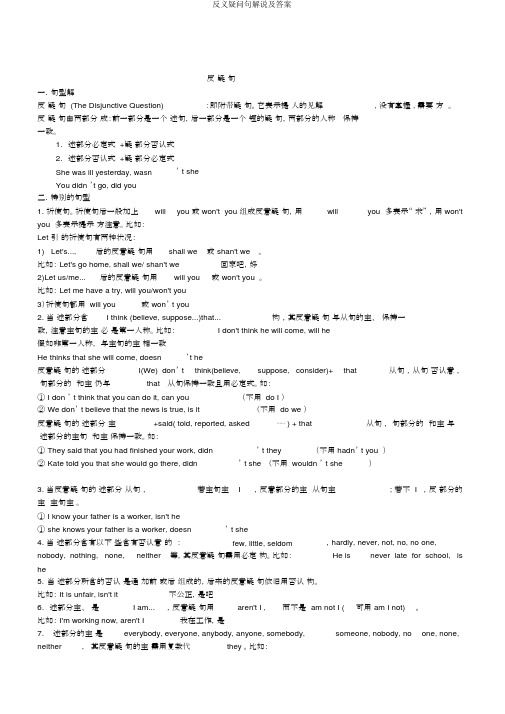
反疑句一.句型解反疑句 (The Disjunctive Question):即附带疑句。
它表示提人的见解, 没有掌握 , 需要方。
反疑句由两部分成:前一部分是一个述句,后一部分是一个短的疑句,两部分的人称保持一致。
1.述部分必定式 +疑部分否认式2.述部分否认式 +疑部分必定式She was ill yesterday, wasn’ t sheYou didn ’t go, did you二.特别的句型1. 祈使句。
祈使句后一般加上will you 或 won't you 组成反意疑句,用will you 多表示“ 求” ,用 won't you 多表示提示方注意。
比如:Let 引的祈使句有两种状况:1) Let's...,后的反意疑句用shall we或 shan't we。
比如: Let's go home, shall we/ shan't we回家吧,好2)Let us/me...后的反意疑句用will you或 won't you 。
比如: Let me have a try, will you/won't you3)祈使句都用 will you或 won’ t you2. 当述部分含I think (believe, suppose...)that...构,其反意疑句与从句的主、保持一致,注意主句的主必是第一人称。
比如:I don't think he will come, will he假如非第一人称,与主句的主相一致He thinks that she will come, doesn’t he反意疑句的述部分I(We) don’ t think(believe,suppose,consider)+that从句,从句否认意,句部分的和主仍与that从句保持一致且用必定式。
如:① I don ’ t think that you can do it, can you(不用 do I )② We don’ t believe that the news is true, is it(不用 do we )反意疑句的述部分主+said( told, reported, asked⋯⋯ ) + that从句,句部分的和主与述部分的主句和主保持一致。
英语反义疑问句讲解及练习题

②We don’t believe that the news is true, is it? (不用do we?)
九.反意疑问句的陈述部分为非第一人称主语+ think(believe, suppose, consider) + that从句时,问句部分的动词和主语与陈述部分的主句动词和主语保持一致。如:①They all think that English is very important, don’t
No, she doesn’t. ___________________
17.You don’t study Chinese, do you?
翻译:Yes, we do. ________________
No, we don’t. _______________
18.Your friends didn’t have a good time without you last
1Something is wrong with the computer, isn’t it?
2Nothing has happened to them, has it?
十二、陈述部分的主语为不定代词somebody(someone), anybody(anyone), nobody(no one), everybody(everyone)时,问句部分的主语用he或they,这时问句动词的数应和he或they一致。如:①Someone has taken the seat, hasn’t he?
they? (不用isn’t it?)
②He didn’t think that the news was true, did he? (不用wasn’t/ was it?)
高考英语反意疑问句详解及练习

反意疑问句详解反意疑问句是一种礼貌用语,常用在闲聊中,说话人对自己的陈述还没有十分的把握,需要征求对方的同意或肯定,印证所陈述之事。
它是英语中的四大问句之一。
反意疑问句的种类和结构反意疑问句是由一个陈述句加上一个短问句而构成的,其疑问部分的动词与陈述部分的动词在语气上成相反的对应关系,其基本句子结构有以下两种:1. 肯定陈述句+简略否定问句,即:前肯后否。
如:It‟s very hot today, isn‟t it? 今天很热,是吗?2. 否定陈述句+简略肯定问句,即:前否后肯。
如:Bill didn‟t want to go, did he? 比尔不想去,是吧?反意疑问句构成上的几条原则1. 简略问句中的be动词、情态动词或助动词在人称、数及时态上,应和陈述部分相一致。
①陈述部分为be (充当系动词或助动词)时,简略问句中用相应形式的be (am, is are, was, were)。
如:I‟m not late, am I? 我没迟到,是吧?They‟re playing soccer on the playground, aren‟t they? 他们在操场上踢足球,是不是?②陈述部分含有情态动词或者助动词时,简略疑问部分该情态动词或助动词的相应形式。
如:You could swim five years ago, couldn‟t you? 你五年前就会游泳,是吗?He has been learning English for four years, hasn‟t he? 他一直学了四年英语,对吗?We don‟t go to work on Sun days, do we? 星期日我们不用上班,对不对?③陈述部分没有be动词、情态动词或者助动词时,简略疑问部分须依据人称、数以及时态而使用助动词do, does 或者did。
如:Neither of them complained, did they? 他俩都没抱怨,对吧?You always stay up late every night, don‟t you? 你每天晚上都熬夜,是不是?This picture looks very nice, d oesn‟t it? 这画很好看,对吗?2. 简略否定问句中的not一般要和be、情、助等加以缩略。
反义疑问句详细讲解及习题及答案精编版

反义疑问句详细讲解及习题及答案文件编码(008-TTIG-UTITD-GKBTT-PUUTI-WYTUI-8256)反义疑问句一.句型解释反义疑问句(The Disjunctive Question):即附加疑问句。
它表示提问人的看法,没有把握,需要对方证实。
反义疑问句由两部分组成:前一部分是一个陈述句,后一部分是一个简短的疑问句,两部分的人称时态应保持一致。
1.陈述部分肯定式+疑问部分否定式2.陈述部分否定式+疑问部分肯定式She was ill yesterday, wasn’t sheYou didn’t go, did you二.特殊的句型1.祈使句。
祈使句后一般加上will you或won't you构成反意疑问句,用will you 多表示“请求”,用won't you 多表示提醒对方注意。
例如:Let引导的祈使句有两种情况:1) Let's...,后的反意疑问句用shall we或shan't we。
例如:Let's go home, shall we/ shan't we 回家吧,好吗2)Let us/me...后的反意疑问句用will you或won't you。
例如:Let me have a try, will you/won't you3)祈使句都用will you 或won’t you2.当陈述部分含I think (believe, suppose...)that... 结构时,其反意疑问句须与从句的主、谓语保持一致,注意主句的主语必须是第一人称。
例如: I don't think he will come, will he若是非第一人称,则与主句的主语相一致He thinks that she will come, doesn’t he反意疑问句的陈述部分为I(We) don’t think(believe, suppose, consider)+ that从句时,从句为否定意义,问句部分的动词和主语仍与that从句保持一致且用肯定式。
(完整)反义疑问句讲解和练习(答案)
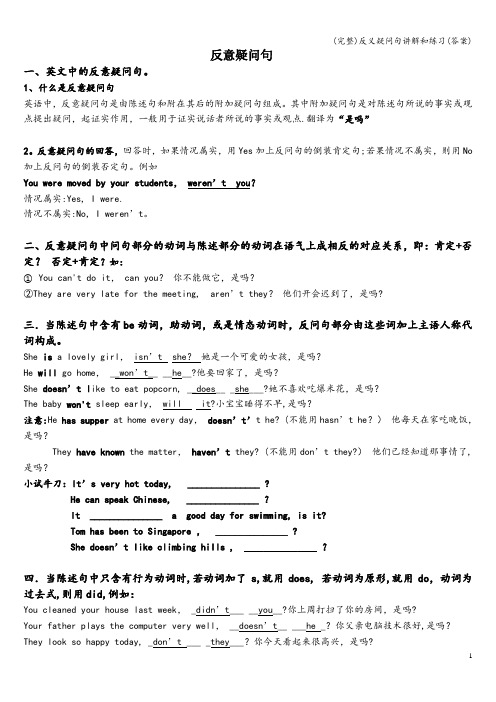
反意疑问句一、英文中的反意疑问句。
1、什么是反意疑问句英语中,反意疑问句是由陈述句和附在其后的附加疑问句组成。
其中附加疑问句是对陈述句所说的事实或观点提出疑问,起证实作用,一般用于证实说话者所说的事实或观点.翻译为“是吗”2。
反意疑问句的回答,回答时,如果情况属实,用Yes加上反问句的倒装肯定句;若果情况不属实,则用No 加上反问句的倒装否定句。
例如You were moved by your students,weren’t you?情况属实:Yes, I were.情况不属实:No, I weren’t。
二、反意疑问句中问句部分的动词与陈述部分的动词在语气上成相反的对应关系,即:肯定+否定?否定+肯定?如:①You can't do it, can you?你不能做它,是吗?②They are very late for the meeting, aren’t they?他们开会迟到了,是吗?三.当陈述句中含有be动词,助动词,或是情态动词时,反问句部分由这些词加上主语人称代词构成。
She is a lovely girl,isn’t she?她是一个可爱的女孩,是吗?He will go home, __won’t__ __he__?他要回家了,是吗?She doesn’t l ike to eat popcorn, __does__ _she___?她不喜欢吃爆米花,是吗?The baby won't sleep early, will it?小宝宝睡得不早,是吗?注意:He has supper at home every day,doesn’t’t he? (不能用hasn’t he?)他每天在家吃晚饭,是吗?They have known the matter,haven’t they? (不能用don’t they?)他们已经知道那事情了,是吗?小试牛刀:It’s very hot today, _______________ ?He can speak Chinese, _______________ ?It _______________ a good day for swimming, is it?Tom has been to Singapore , _______________ ?She do esn’t like climbing hills , _______________ ?四.当陈述句中只含有行为动词时,若动词加了s,就用does, 若动词为原形,就用do,动词为过去式,则用did,例如:You cleaned your house last week, _didn’t___ __you__?你上周打扫了你的房间,是吗?Your father plays the computer very well, __doesn’t__ ___he _?你父亲电脑技术很好,是吗?They look so happy today, _don’t ___ _they___?你今天看起来很高兴,是吗?小试牛刀: Meimei studies in a middle school, _______________ ?He loves cold weather , _______________ ?You finished the task yesterday, _______________ ?五.反意疑问句的陈述部分带有little, few, never, hardly, seldom,nobody, nothing,barely, scarcely等否定意义的词时,问句部分用肯定式.如:①She never tells a lie, does she?(不用doesn’t she?)她从不说谎,是吗?②He was seldom late, was he?(不用wasn’t he?) 他几乎不迟到,是吗?小试牛刀:Few students can answer the question, _______________ ?He can hardly finish his homework, _______________ ?六、反意疑问句的陈述部分为I am……时,问句部分习惯上用aren’t I?表示.如:I am a very honest man, aren’t I? 我是个很诚实的人,是吗?小试牛刀:I’m in Class 3,Grade 2, _______________ ?I’m ten years old, _______________ ?七.陈述部分的主语为不定代词something, anything, nothing, everything时,问句部分的主语用it。
(完整版)反义疑问句详细讲解及习题及答案
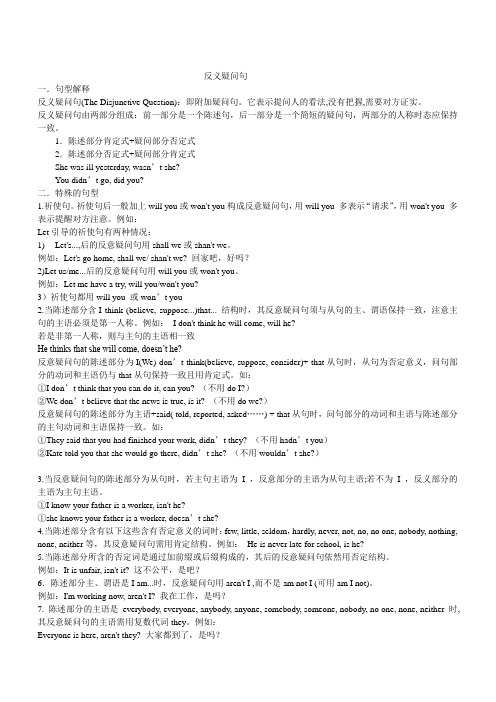
反义疑问句一.句型解释反义疑问句(The Disjunctive Question):即附加疑问句。
它表示提问人的看法,没有把握,需要对方证实。
反义疑问句由两部分组成:前一部分是一个陈述句,后一部分是一个简短的疑问句,两部分的人称时态应保持一致。
1.陈述部分肯定式+疑问部分否定式2.陈述部分否定式+疑问部分肯定式She was ill yesterday, wasn’t she?You didn’t go, did you?二.特殊的句型1.祈使句。
祈使句后一般加上will you或won't you构成反意疑问句,用will you 多表示“请求”,用won't you 多表示提醒对方注意。
例如:Let引导的祈使句有两种情况:1) Let's...,后的反意疑问句用shall we或shan't we。
例如:Let's go home, shall we/ shan't we? 回家吧,好吗?2)Let us/me...后的反意疑问句用will you或won't you。
例如:Let me have a try, will you/won't you?3)祈使句都用will you 或won’t you2.当陈述部分含I think (believe, suppose...)that... 结构时,其反意疑问句须与从句的主、谓语保持一致,注意主句的主语必须是第一人称。
例如:I don't think he will come, will he?若是非第一人称,则与主句的主语相一致He thinks that she will come, doesn’t he?反意疑问句的陈述部分为I(We) don’t think(believe, suppose, consider)+ that从句时,从句为否定意义,问句部分的动词和主语仍与that从句保持一致且用肯定式。
(完整版)高考英语反意疑问句讲解及练习
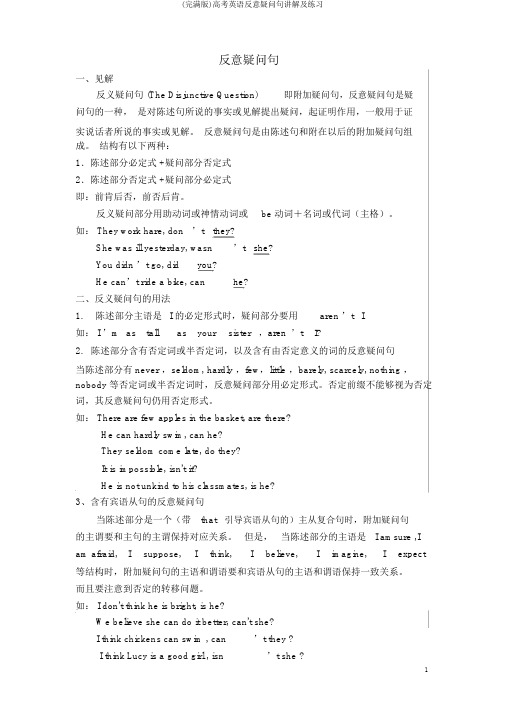
反意疑问句一、见解反义疑问句 (The Disjunctive Question)即附加疑问句,反意疑问句是疑问句的一种,是对陈述句所说的事实或见解提出疑问,起证明作用,一般用于证实说话者所说的事实或见解。
反意疑问句是由陈述句和附在以后的附加疑问句组成。
结构有以下两种:1.陈述部分必定式 +疑问部分否定式2.陈述部分否定式 +疑问部分必定式即:前肯后否,前否后肯。
反义疑问部分用助动词或神情动词或be 动词+名词或代词(主格)。
如: They work hare, don’t they?She was ill yesterday, wasn’t she?You didn ’t go, did you?He can’t ride a bike, can he?二、反义疑问句的用法1. 陈述部分主语是I 的必定形式时,疑问部分要用aren ’t I.如: I ’m as tall as your sister,aren’t I?2.陈述部分含有否定词或半否定词,以及含有由否定意义的词的反意疑问句当陈述部分有 never ,seldom, hardly ,few,little ,barely, scarcely, nothing ,nobody 等否定词或半否定词时,反意疑问部分用必定形式。
否定前缀不能够视为否定词,其反意疑问句仍用否定形式。
如: There are few apples in the basket, are there?He can hardly swim, can he?They seldom come late, do they?It is impossible, isn't it?He is not unkind to his classmates, is he?3、含有宾语从句的反意疑问句当陈述部分是一个(带that引导宾语从句的)主从复合句时,附加疑问句的主谓要和主句的主谓保持对应关系。
高考英语反意疑问句专题讲解练习

高考反义疑问句讲解一,反义疑问句的主语只能是代词1.Tom is a good student, ? isn’t he2.Everything goes well, ? Doesn’t it3.That’s a good idea, ? Isn’t it4.Those are what he stole from the shop, ? Aren’t they5.Someone is calling me, ? Isn’t he6.To see is to believe, ? Isn’t it7.There is no reason for doing that, ?Is there8.Bill’s aim is to inform the visitors that cigarette advertisement on TV is illegal, ? Isn’t it 9.Y ou and I could hardly work together, ? Could we二,宾语从句中的反义疑问句1,在含有宾语从句的复合句中,一般要看主句,例如:I told him not everyone could run as fast as you did, ? BA, could he B, didn’t I C, didn’t you D, could theyHe said that he would come back next Monday ,? BA, couldn’t he B, didn’t he C, didn’t it D, could he2, 主句是I/ We think (believe, suppose, expect, imagine,consider等)时,看从句。
(此时还有注意否定前置),例如:I don’t suppose anyone will volunteer to paint such a big house, ? CA, do I B, don’t I C, will they D, won’t theyMrs. Black doesn’t believe her son is able to pass the exam, ? DA, is he B, isn’t he C, doesn’t she D, does he三,it 句式中的反义疑问句It’s the first time that he has been to Australia, ? CA, isn’t he B, hasn’t he C, isn’t it D, hasn’t itIt doesn’t matter if they want to come to your party, ? BA, doesn’t it B, does it C, don’t they D, do theyIt was said that Li Dan has won the gold medal, ? CA, isn’t it B, is it C, hasn’ t he D, has heIt is reported that China has created the first man-made sun in the world recently, ? CA, isn’t it B, is it C, hasn’ t it D, has it四,祈使句的反义疑问句Let’s 后用shall we, 其实情况用will youWhen you’ve finished with that book, don’t forget to put it back on the shelf, ? CA,do you B, don’t you C, will you D, won’t youWe forgot to bring our tickets, but please let us enter, ? CA, do you B, can we C, will you D, shall we---- Alice, you feed the bird today, ? B---- But I fed it yesterday.A, do you B, will you C, didn’t you D, don’ t you五,并列句的反义疑问句He was a lazy boy, and he didn’t pass the exam, ? Did he Neither you nor I can solve the problem properly, ? Can we六,由含有否定的词缀的词所构成的否定1,否定意义的词汇:never, seldom, hardly, few, little, barely, scarcely, nothing, non, rarely, no, not, no one, nobody, neither等There are few apples in the basket , ?He can hardly swim, ?They seldom come here, ?2, 否定前缀un-, dis-, no-等,否定后缀-less等,不影响反义疑问句He looks unhappy, ?Doesn’t heThe girl dislikes history, ? Doesn’t she七,情态动词表推测时的反义疑问句It must have rained last night, it? DA, mustn’t B, can’t C, hasn’t D, didn’tY ou must be a writer, you? BA,can’t B, aren’t C, must D, mustn’tHe must be helping the old man to water the flowers, ? BA, is he B, isn’t he C, must he D, mustn’t heThere is no light in the dormitory. They must have gone to the lecture, ? D A, didn’t they B, don’t they C, mustn’t they D, haven’t theyI don’t think he could have finished the job by the time last night, ? DA,have he B, could he C, did he D, had he八,need, dare, used to, ought to 等词的反义疑问句Y ou didn’t use to like him much when we were at school, ? CA, were you B, weren’t you C, did you D, didn’ t youI don’t need to tell him anything, ? AA, do I B, don’t I C, needn’t I D, need I九,其他I wish to have a rest now, ? May IThey must not take the book out of the library, ? May they There used to be a bridge over the river, ? Didn’t there/ usedn’t there 十,练习1. If you don’t go, _____.A. so do IB. so will IC. nor do ID. neither shall I2. It was Mr.Smith that you met at the meeting, _________?A.wasn’t it B.was it C.did you D.didn’t you3. Listen! His family must be quarreling, ?A.mustn’t it B.aren’t they C.isn’t it D.needn’t they4. Let's take a walk, ________?A. will youB. don't weC. do weD. shall we5. Y ou must have seen him off yesterday, _________?A. haven't youB. didn't youC. mustn't youD. needn't you6. Y ou must be fifty, ________?A. mustn't youB. needn't youC. aren't youD. mnyn't you7. It’s a fine day, Let’s go fishing, _____?A. won’t weB. will weC. don’t weD. shall we8. Frank is working late again. This is the first time this week he’s had to study late, ____?A. isn’t heB. hasn’t itC. hasn’t heD. isn’t it9. —Daddy’s forgot to post the letter again, ____?—I’m af raid he ___.A. has; hasB. isn’t; isC. hasn’t; hasD. has; hasn’t10. —Sorry, I’m not feeling well and I don’t think I can finish.—Don’t worry. Let us do it for you , ____?A. will youB. shall weC. shan’t weD. s hall you11. I don’t think he could have done such a stupid thing last night, ____?A. do IB. could heC. did heD. has he12. —The ground is wet.—It must have rained last night,____ ?A. hasn’t itB. didn’t itC. mustn’t itD. isn’t it13. —Jenny doesn’t think that Robert is honest, ___?—I’m afraid not.A. is heB. isn’t heC. does sheD. doesn’t she14. —The new windows need washing.—Well, let’s wash them together, ____?A. shall weB. will youC. should weD. would you15. There is little we can do about it, ____?A. is thereB. can’t weC. isn’t thereD. can we16. —The problem wasn’t difficult for him, was it ?—______. He should have been given a more difficult one.A. No, it wasB. Y es, it wasC. Y es, it wasn’tD. No, it wasn’t17. Let us take a walk, ________? w.w.w.k.s.5.u.c.o.mA. will youB. don't weC. do weD. shall we18. Tom dislike playing tennis, ________?A. does heB. doesn’t heC. is he D isn’t he19. I don't believe he will succeed, _______?A. does heB. doesn’t heC. will he D won’t he20. He doesn't believe he will succeed, _______?A. does heB. doesn’t heC. will he D won’t he参考答案1. D2. A3. B4. D5.B6.C7.D8.D9.C 10.A 11.C 12.B 13. C 14.A 15.A 16. D 17. A 18. B 19. C 20. A。
高中英语反义疑问句练习题及讲解
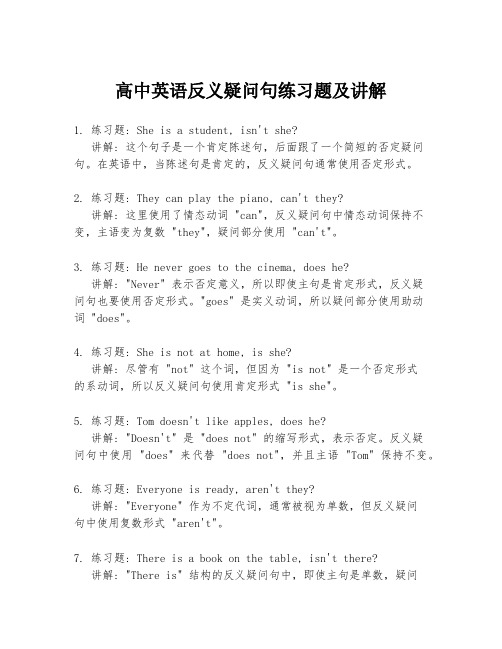
高中英语反义疑问句练习题及讲解1. 练习题: She is a student, isn't she?讲解: 这个句子是一个肯定陈述句,后面跟了一个简短的否定疑问句。
在英语中,当陈述句是肯定的,反义疑问句通常使用否定形式。
2. 练习题: They can play the piano, can't they?讲解: 这里使用了情态动词 "can",反义疑问句中情态动词保持不变,主语变为复数 "they",疑问部分使用 "can't"。
3. 练习题: He never goes to the cinema, does he?讲解: "Never" 表示否定意义,所以即使主句是肯定形式,反义疑问句也要使用否定形式。
"goes" 是实义动词,所以疑问部分使用助动词 "does"。
4. 练习题: She is not at home, is she?讲解: 尽管有 "not" 这个词,但因为 "is not" 是一个否定形式的系动词,所以反义疑问句使用肯定形式 "is she"。
5. 练习题: Tom doesn't like apples, does he?讲解: "Doesn't" 是 "does not" 的缩写形式,表示否定。
反义疑问句中使用 "does" 来代替 "does not",并且主语 "Tom" 保持不变。
6. 练习题: Everyone is ready, aren't they?讲解: "Everyone" 作为不定代词,通常被视为单数,但反义疑问句中使用复数形式 "aren't"。
史上最全最有方法的反义疑问句讲解及练习
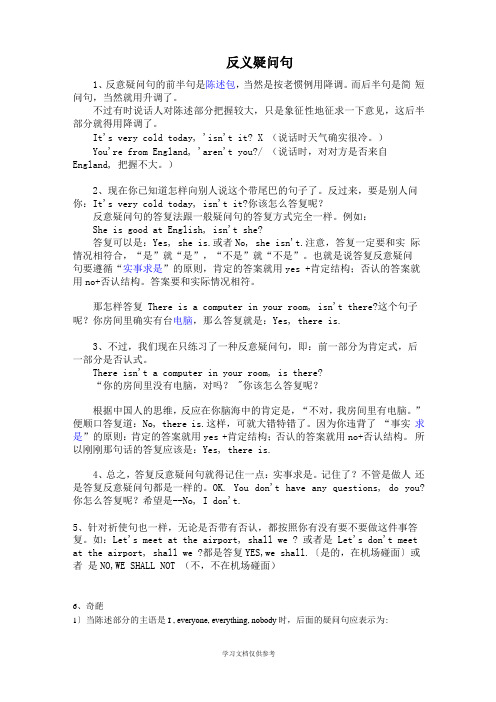
反义疑问句1、反意疑问句的前半句是陈述包,当然是按老惯例用降调。
而后半句是简短问句,当然就用升调了。
不过有时说话人对陈述部分把握较大,只是象征性地征求一下意见,这后半部分就得用降调了。
It's very cold today, 'isn't it? X (说话时天气确实很冷。
)You're from England, 'aren't you?/ (说话时,对对方是否来自England, 把握不大。
)2、现在你已知道怎样向别人说这个带尾巴的句子了。
反过来,要是别人问你:It's very cold today, isn't it?你该怎么答复呢?反意疑问句的答复法跟一般疑问句的答复方式完全一样。
例如:She is good at English, isn't she?答复可以是:Yes, she is.或者No, she isn't.注意,答复一定要和实际情况相符合,“是”就“是”,“不是”就“不是”。
也就是说答复反意疑问句要遵循“实事求是”的原则,肯定的答案就用yes +肯定结构;否认的答案就用no+否认结构。
答案要和实际情况相符。
那怎样答复 There is a computer in your room, isn't there?这个句子呢?你房间里确实有台电脑,那么答复就是:Yes, there is.3、不过,我们现在只练习了一种反意疑问句,即:前一部分为肯定式,后一部分是否认式。
There isn't a computer in your room, is there?“你的房间里没有电脑,对吗? "你该怎么答复呢?根据中国人的思维,反应在你脑海中的肯定是,“不对,我房间里有电脑。
” 便顺口答复道:No, there is.这样,可就大错特错了。
因为你违背了“事实求是”的原则:肯定的答案就用yes +肯定结构;否认的答案就用no+否认结构。
反义疑问句(含解析、例句及详尽用法)
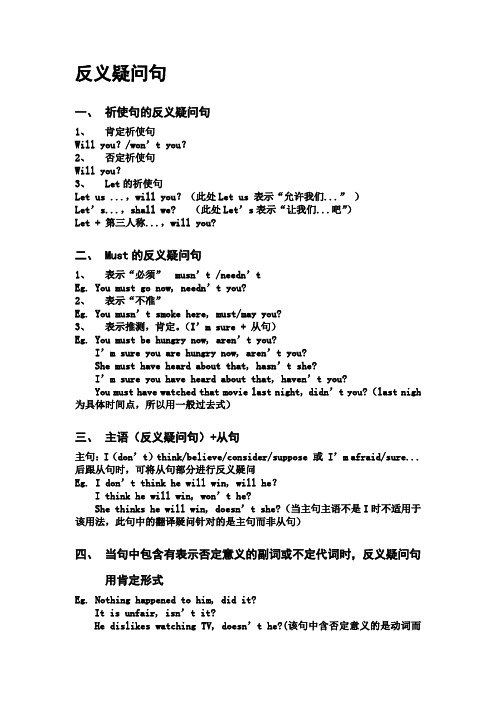
反义疑问句一、祈使句的反义疑问句1、肯定祈使句Will you?/won’t you?2、否定祈使句Will you?3、Let的祈使句Let us ...,will you?(此处Let us 表示“允许我们...”)Let’s...,shall we? (此处Let’s表示“让我们...吧”)Let + 第三人称...,will you?二、Must的反义疑问句1、表示“必须” musn’t /needn’tEg. You must go now, needn’t you?2、表示“不准”Eg. You musn’t smoke here, must/may you?3、表示推测,肯定。
(I’m sure + 从句)Eg. You must be hungry now, aren’t you?I’m sure you are hungry now, aren’t you?She must have heard about that, hasn’t she?I’m sure you have heard about that, haven’t you?You must have watched that movie last night, didn’t you?(last nigh 为具体时间点,所以用一般过去式)三、主语(反义疑问句)+从句主句:I(don’t)think/believe/consider/suppose 或 I’m afraid/sure...后跟从句时,可将从句部分进行反义疑问Eg. I don’t think he will win, will he?I think he will win, won’t he?She thinks he will win, doesn’t she?(当主句主语不是I时不适用于该用法,此句中的翻译疑问针对的是主句而非从句)四、当句中包含有表示否定意义的副词或不定代词时,反义疑问句用肯定形式Eg. Nothing happened to him, did it?It is unfair, isn’t it?He dislikes watching TV, doesn’t he?(该句中含否定意义的是动词而非副词或不定代词,因此不适用于该用法,反义疑问句仍然使用否定形式)五、反义疑问句的回答反义疑问句的回答针对被提问部分的谓语动词,且与回答句前部分的Yes和No 保持一致Eg. A: You haven’t lost the ticket, have you?B: D I know it’s hard to get another one at this moment.A. Yes, I haven’tB. No, I haveC. I hope soD. I’m afraid not六、陈述部分的主语与反义疑问句主语保持一致的情况1、OneEg. One can’t be too careful when driving a car, can one/he?一个人在开车的时候再怎么小心也不为过。
反义疑问句详解及练习题(带答案)

反义疑问句详解及练习题(带答案)反义疑问句的用法1.定义:反义疑问句,表示说话人提出看法、建议或意见,问对方同意与否。
2.结构:有两部分组成,前一部分为陈述形式,后一部分为疑问句。
3.形式:前肯后否与前否后肯。
XXX isn't beautiful, is she?露西不漂亮,是吗?Li Ming is pretty handsome, isn't he?XXX相当帅,不是吗?4.回答:肯定回答:“Yes+肯定结构”,否定回答“No+否定结构”,但是注意“Yes”要译为“不”,“No”要译为“是”。
-Your sister is a XXX, isn't she?你妹妹是老师,不是吗?-Yes, she is.不,她是老师。
-You can play the guitar, can't you?你会弹吉他,不是吗?-No, I can't.是的,我不会。
特别注意:1)当陈述部分为否定式,反意疑问句为肯定式时,其回答往往与汉语不一致"It isn’t cheap, is it?" "Yes, it is."“它不便宜吧?”“不,很便宜。
”"He doesn’t love her, does he?" "No, he doesn’t."“他不爱她,是吗?”“是的,他不爱她。
”此时,"Yes"即不,对前面"It XXX."的否定。
否认反意疑问句的回覆当陈述部分为肯定式,反意疑问句为否定式时,其回答一般不会造成困难,一般只需照情况回答即可:"It’s new, isn’t it?" "Yes, it is."“是新的,对吗?”“对,是新的。
”"He wants to go, doesn’t he?" "No, he doesn’t."“他想去,对吗?”“不,他不想去。
高考英语反意疑问句讲解及练习
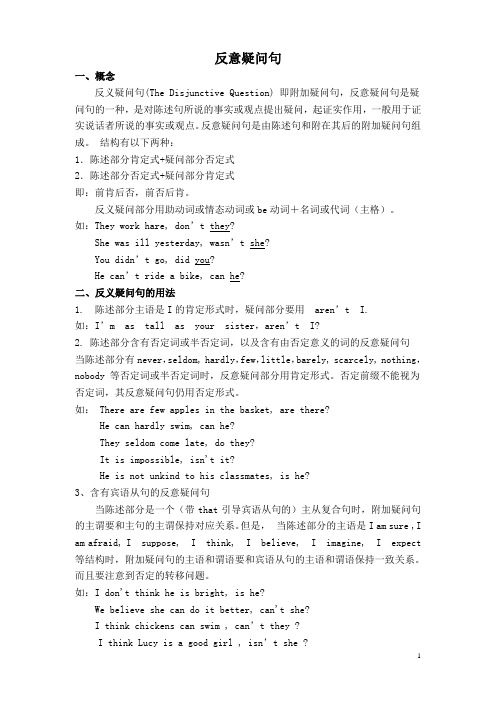
反意疑问句一、概念反义疑问句(The Disjunctive Question) 即附加疑问句,反意疑问句是疑问句的一种,是对陈述句所说的事实或观点提出疑问,起证实作用,一般用于证实说话者所说的事实或观点。
反意疑问句是由陈述句和附在其后的附加疑问句组成。
结构有以下两种:1.陈述部分肯定式+疑问部分否定式2.陈述部分否定式+疑问部分肯定式即:前肯后否,前否后肯。
反义疑问部分用助动词或情态动词或be动词+名词或代词(主格)。
如:They work hare, don’t they?Sh e was ill yesterday, wasn’t she?You didn’t go, did you?He can’t ride a bike, can he?二、反义疑问句的用法1. 陈述部分主语是I的肯定形式时,疑问部分要用aren’t I.如:I’m as tall as your sister,aren’t I?2. 陈述部分含有否定词或半否定词,以及含有由否定意义的词的反意疑问句当陈述部分有never,seldom, hardly,few,little,barely, scarcely, nothing,nobody 等否定词或半否定词时,反意疑问部分用肯定形式。
否定前缀不能视为否定词,其反意疑问句仍用否定形式。
如: There are few apples in the basket, are there?He can hardly swim, can he?They seldom come late, do they?It is impossible, isn't it?He is not unkind to his classmates, is he?3、含有宾语从句的反意疑问句当陈述部分是一个(带that引导宾语从句的)主从复合句时,附加疑问句的主谓要和主句的主谓保持对应关系。
但是,当陈述部分的主语是I am sure ,I am afraid, I suppose, I think, I believe, I imagine, I expect 等结构时,附加疑问句的主语和谓语要和宾语从句的主语和谓语保持一致关系。
(完整版)反义疑问句的用法归纳及习题

(完整版)反义疑问句的⽤法归纳及习题反意疑问句【反意疑问句】(⼀)概念:反意疑问句是由陈述句和附在其后的附加疑问句组成。
其中附加疑问句是对陈述句所说的事实或观点提出疑问,起证实作⽤,⼀般⽤于证实说话者所说的事实或观点。
(⼆)要点注意:1、反意疑问句前后两部分谓语应是:“肯定陈述+否定疑问”或“否定陈述+肯定疑问”。
2、简略问句如果是否定式:not应与be,do,will等系动词、助动词、情态动词缩写。
3、简略问句的主语不⽤名词,应⽤⼈称代词。
4、陈述部分含“too...to”时,是否定句。
(三)⽤法:1) 陈述部分I am时,疑问部分要⽤aren't I.I'm as tall as your sister,aren't I?(我和你姐姐⼀样⾼,对吗?)2) 陈述部分⽤no, nothing, nobody, never, few, little, seldom, rarely,hardly等否定含义的词时,疑问部分⽤肯定含义。
如:The old man made no answer, did he?Jim is never late for school, is he?3) 陈述部分有情态动词have to +v. (had to + v.),疑问部分常⽤don't +主语(didn't +主语)。
We have to get there at eight tomorrow, don't we?used to,疑问部分⽤didn't +主语或usedn't +主语。
He used to take pictures there, didn't he? / usedn't he?had better(最好)+ v. 疑问句部分⽤hadn't you?You'd better read it by yourself, hadn't you?4) 陈述部分有would rather(宁可、宁愿)+v.,疑问部分多⽤wouldn't +主语。
高中英语语法:反义疑问句专项讲解(含答案)
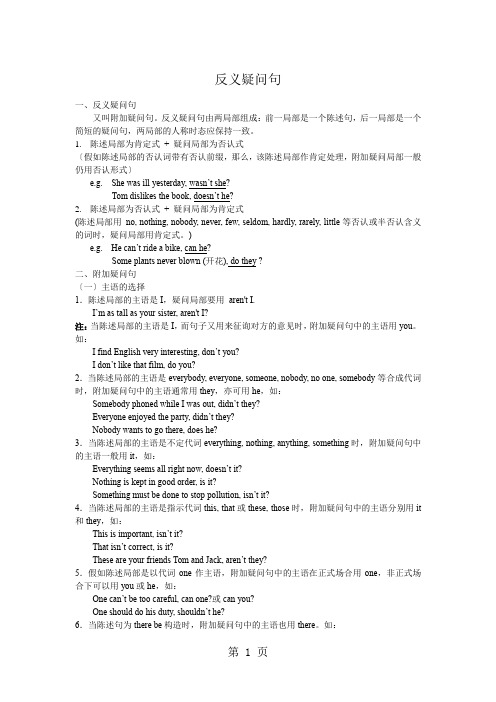
反义疑问句一、反义疑问句又叫附加疑问句。
反义疑问句由两局部组成:前一局部是一个陈述句,后一局部是一个简短的疑问句,两局部的人称时态应保持一致。
1.陈述局部为肯定式+ 疑问局部为否认式〔假如陈述局部的否认词带有否认前缀,那么,该陈述局部作肯定处理,附加疑问局部一般仍用否认形式〕e.g. She was ill yesterday, wasn’t she?Tom dislikes the book, doesn’t he?2.陈述局部为否认式+ 疑问局部为肯定式(陈述局部用no, nothing, nobody, never, few, seldom, hardly, rarely, little等否认或半否认含义的词时,疑问局部用肯定式。
)e.g. He can’t ride a bike, can he?Some plants never blown (开花), do they ?二、附加疑问句〔一〕主语的选择1.陈述局部的主语是I,疑问局部要用aren't I.I’m as tall as your sister, aren't I?注:当陈述局部的主语是I,而句子又用来征询对方的意见时,附加疑问句中的主语用you。
如:I find English very interesting, don’t you?I don’t like that film, do you?2.当陈述局部的主语是everybody, everyone, someone, nobody, no one, somebody等合成代词时,附加疑问句中的主语通常用they,亦可用he,如:Somebody phoned while I was out, didn’t they?Everyone enjoyed the party, didn’t they?Nobody wants to go there, does he?3.当陈述局部的主语是不定代词everything, nothing, anything, something时,附加疑问句中的主语一般用it,如:Everything seems all right now, doesn’t it?Nothing is kept in good order, is it?Something must be done to stop pollution, isn’t it?4.当陈述局部的主语是指示代词this, that或these, those时,附加疑问句中的主语分别用it 和they,如:This is important, isn’t it?That isn’t correct, is it?These are your friends Tom and Jack, aren’t they?5.假如陈述局部是以代词one作主语,附加疑问句中的主语在正式场合用one,非正式场合下可以用you或he,如:One can’t be too careful, can one?或can you?One should do his duty, shouldn’t he?6.当陈述句为there be构造时,附加疑问句中的主语也用there。
反义疑问句讲解及习题及答案
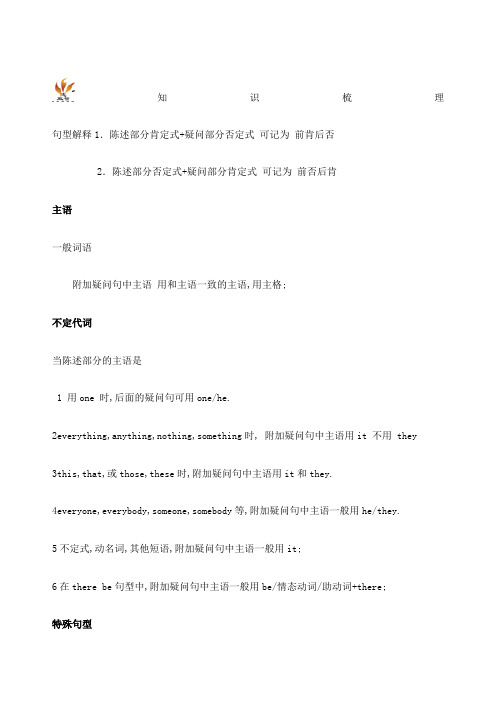
知识梳理句型解释1.陈述部分肯定式+疑问部分否定式可记为前肯后否2.陈述部分否定式+疑问部分肯定式可记为前否后肯主语一般词语附加疑问句中主语用和主语一致的主语,用主格;不定代词当陈述部分的主语是1 用one 时,后面的疑问句可用one/he.2everything,anything,nothing,something时, 附加疑问句中主语用it 不用 they3this,that,或those,these时,附加疑问句中主语用it和they.4everyone,everybody,someone,somebody等,附加疑问句中主语一般用he/they.5不定式,动名词,其他短语,附加疑问句中主语一般用it;6在there be句型中,附加疑问句中主语一般用be/情态动词/助动词+there;特殊句型否定意义的词否定意义的词1当陈述部分有never,seldom, hardly,few,little,barely, scarcely, nothing 等否定意义的词时,后面的反意疑问句则为肯定形式:There are few apples in the basket, are thereHe can hardly swim, can heThey seldom come late, do they2当陈述部分含有否定意思的词是unhappy,dislike,unfriendly等含有否定词缀的派生词,也就是有un-前缀、-less后缀等含有词缀而意思否定的词,当做肯定句处理,疑问部分要用否定形式;如:He looks unhappy,doesn't he他看上去不高兴,不是吗The girl dislikes history,doesn't she这女孩不喜欢历史,不是吗有less,fewer 等词视为肯定词,疑问部分用否定形式;如:There will be less pollution, won't there 表示主语主观意愿的词含有think, believe, suppose, imagine, expect等动词后接宾语从句构成的主从复合句在构成反意疑问句时,视情况不同有两种不同的构成方式;1.当主句的主语为第一人称时,其后的简短问句应与从句相一致;例如:I expect our English teacher will be back this weekend, won't she/heWe suppose you have finished the project, haven't you值得注意的是,当这些动词后接的宾语从句的否定转移到主句时,其仍属否定句,故其后的简短问句应用肯定式,而非否定式;例如:I don't believe that he can translate this book, can heWe don't imagine the twins have arrived, have they此类句子的回答同"前否后肯"型反意疑问句一样,如上述后一个句子,若双胞胎已经到了,则回答为"Yes, they have.";若尚未到达,使用"No, they haven't.";2.当主句的主语为第二、三人称时,其后的简短问句则应与主句相一致此时,否定只看主句,与从句无关...;例如:Your sister supposes she needs no help, doesn't sheYou thought they could have completed the project, didn't youThey don't believe she's an engineer, do theyShe doesn't expect that we are coming so soon, does she3但如果主句的时态是过去时等等,疑问句应和主句的人称时态保持一致;had better或have陈述部分有had better,或其中的have表示完成时态时,疑问句应用hadn’t等开头:You’d better get up early, hadn’t you其他情况句中有have时疑问句应用don't等开头如have表示“有”的时候,有两种形式:-He has two sisters,doesn't he-He doesn't have any sisters,doe she祈使句当陈述部分是祈使句时,疑问句要根据语气来表达当开头是Let‘s时,一定要用shall we;其余都用will you包括 Let us不论肯定否定Let’s go out for a walk, shall weLet us go out for a walk, will youLet me help you,may ITurn on the radio, will youThere be句型There be 句型中,反义疑问部分必须为be 动词 + thereThere are some apples in the basket, aren't thereThere isn't any milk left, is theremust.当陈述部分有情态动词must,问句有4种情况:1mustn't表示“禁止,不可,不必”时,附加问句通常要用must.You mustn't stop your car here,must you 你不能把车停在这地方,知道吗2must表示“有必要”时,附加问句通常要用needn't.They must finish the work today,needn't they 他们今天要完成这项工作,是吗3当must用来表示对现在的情况进行推测时,问句通常要根据must后面的动词采用相应的形式; He must be good at English,isn't he 他英语一定学得很好,是吗4当must+have done表示对过去的情况进行推测一般句中有明确的过去时间状语,问句要根据陈述部分谓语的情况用“didn't+主语”或“wasn't/weren't+主语”;如果强调动作的完成一般没有明确的过去时间状语,问句要用“haven't/hasn't+主语”;She must have read the novel last week,didn't she 她上星期一定读了这本小说,是吗You must have told her about it,haven't you 你一定把这事告诉她了,是吗回答反意疑问句的回答用yes, no, 但是,回答意思相反,当陈述部分是否定形式时,回答要按事实;如:They don’t work hard, do they 他们不太努力工作,是吗Yes, they do. 不,他们工作努力;/No, they don’t. 对, 他们工作不努力肯定反意疑问句的回答当陈述部分为否定式,反意疑问句为肯定式时,其回答往往与汉语不一致,需特别引起注意:"It isn’t cheap, is it" "Yes, it is." “它不便宜吧”“不,很便宜;”"He doesn’t love her, does he" "No, he doesn’t."“他不爱她,是吗”“是的,他不爱她;”此时,"Yes"即不,对前面"It isn't cheap."的否定;否定反意疑问句的回答当陈述部分为肯定式,反意疑问句为否定式时,其回答一般不会造成困难,一般只需照情况回答即可:"It’s new, isn’t it" "Yes, it is." “是新的,对吗”“对,是新的;”"He wants to go, doesn’t he" "No, he doesn’t." “他想去,对吗”“不,他不想去;”此时,"Yes"即是,对前面"It's new."的肯定;回答反意疑问句的原则回答反意疑问句通常应根据实际情况来确定,如有人问你You are asleep, aren’t you 你应回答No, I’m not. 因为既然你能回答,肯定你还没有asleep;但如果别人问你 You aren’t asleep, are you你还没有睡着,对吗,你也只能回答No, I’m not.是的,还没有睡着,而不能回答为Yes, I’m not. 也不能回答成 Yes, I am.“It is a beautiful flower,isn't it”“It isn't a beautiful flower,is it”上述两句句子的回答肯定均为“Yes,it is."否定为“No,it isn't."由上述例子可知,反义疑问句回答与句子本身所包含的中文肯定与否的含义并无太大关联,只需注意事实,肯定即用yes,否定用no,无需考虑句子原本是前否后肯或是前肯后否;反义疑问句练习典题精析1. Linda ate nothing this morning, ___A. didn’t sheB. was sheC. did sheD. wasn’t she2. There’s hardly___ milk in the bottle, _____thereA. no, isn’tB. some, isC. little, isn’tD. any, is3. He has never ridden a horse before, ___A. does heB. has heC. hasn’t heD. doesn’t he4. — He seldom came here, _____— Yes sir.A. didn’t heB. does heC. doesn’t heD. did he5. Everything seems all right, _____A. does itB. don’t theyC. won’t itD. doesn’t it6. One can’t be too modest, can _____A. oneB. heC. itD. we7. No one failed in the exam, _____A. was heB. did oneC. did theyD. didn’t he8. Neither you nor I am an artist, _____ A. am I B. aren’t we C. are we D. ain’t I9. He can’t be her father, _____ heA. isB. isn’tC. canD. can’t10. They have no time to visit the museum, _____A. do theyB. haven’t theyC. don’t theyD. will they11. You’d better go at once, _____ youA. hadn’tB. didC. didn’tD. don’t12. You’d rather work than play, _____ youA. hadn’tB. wouldn’tC. didn’tD. mustn’t13. You dare not do that, _____ youA. don’tB. doC. dareD. daren’t14. He dislikes the two subjects, _____ heA. doesB. doesn’tC. isD. isn’t15. These tools are useless now, _____A. are theyB. aren’t theyC. is itD. isn’t it16. He used to get up at 6:30, _____ he A. didn’t he B. did he C. used he D. wouldn’t he17. He ought to win the first prize, _______ heA. mustn’tB. oughtn’tC. shouldn’tD. Both B and C.18. Let’s go there by bus, ___A. will youB. shall weC. don’t youD. will you19. Let us go to play football, ___A. will youB. shall weC. do weD. are we20. Don’t forget to give Polly some food and change her water, ___A. will youB. shall weC. won’t youD. do you21. —Let’s go shopping this afternoon, _____— All right.A. will weB. shall weC. don’t weD. are we22. — Pass me the dictionary, _____— Yes, with pleasure.A. would youB. will youC. won’t youD. wouldn’t you23. There is little water in the glass, ____ A. isn’t there B. isn’t it C. is it D. is there24. There won’t be any concert this Saturday evening, _____A. will there notB. will thereC. is thereD. won’t25. — I guess she taught herself Japanese, ______— Yes.A. don’t IB. did sheC. do ID. didn’t she26. I don’t believe you are right, _____A. are youB. do youC. won’t youD. do27. She doesn’t think that Tom sings best in the class, _____A. does sheB. doesn’t sheC. does heD. doesn’t he28. I know you didn’t want to hurt me, _____A. did youB. didn’t youC. do ID. don’t I29. If my father were here he would be very happy, _____ A. weren’t he B. were he C. wouldn’t he D. would he能力提升1. It’s the third time that John has been late, ____A. hasn’t heB. isn’t heC. isn’t itD. hasn’t it2. Let’s take a rest, ___________.A. will weB. shall weC. shan’t weD. won’t we3. Let us pass, _________ A. shan’t we B. shall we C. won’t we D. will you4. Wait a minute, __________A. shall youB. will youC. do youD. don’t you5. The suit’s finished, __________ A. doesn’t it B. isn’t it C. haven’t you D. hasn’t it6. He’s posted the letter, _________he A. isn’t B. doesn’t C. hasn’t D. wasn’t7. They’d go with us, __________A. wouldn’t theyB. didn’t theyC. hadn’t theyD. couldn’t they8. What fresh air, ________ A. is it B. does it C. isn’t itD. doesn’t it9. The Emperor’s clothes became the talk of the whole city, _________A. did itB. didn’t itC. did theyD. didn’t they10.Mr. And Mrs. Turner work in this hospital, ________A. are theyB. aren’t theyC. do theyD. don’t they11. She has breakfast at six every day, ________A. has sheB. hasn’t sheC. does sheD. doesn’t she12. Nothing seems to please her, _________ A. does it B. doesn’t it C.is it D. isn’t it13. She never tells a lie, ________ A. does she B. doesn’t she C. is itD. isn’t it14. You hardly know each other, _________A. do youB. don’t youC. have youD. didn’t you15. The man in blue must be your brother, _____A. mustn’t heB. needn’t heC. isn’t heD. is he16. I don’t think he will come to our party, _____A. will heB. won’t heC. does heD. do I17. I suppos e he’s serious, ___________A. do IB. don’t IC. is heD. isn’t he18. Wang said that he was not there then, _____A. did heB. didn’t heC. was heD. wasn’t he19. You daren’t say that to him, _________A. dare youB. do youC. daren’t youD. don’t you20. You must have read about Dickens long ago, __________A. mustn’t youB. haven’t youC. can’t youD. didn’t you随堂小测三智题库QYF21. You’d better not smoke here, ________A. will youB. shall youC. have youD. had you22.There isn’t going to be a volleyball match next week, __________23. A. is it B. isn’t it C. is there D. isn’t there23. There used to be a church behind the cemetery, _____________A. didn’t thereB. used thereC. usedn’t itD. didn’t it24. What a lovely day, _________ A. doesn’t it B. hasn’t it C.won’t D. isn’t it25. You must have been there, ____________A. have youB. did youC. haven’t youD. didn’t you26. That is your school, ___________A. isn’t thatB. mustn’t itC. isn’t itD. won’t it27. She dislikes this skirt, _________________A. doesn’t sheB. does sheC. isn’t sheD. is she28. No one can stop us from going there, ______A. can’t itB. can theyC. can’t theyD. can one师生互动分数评语错题归档确认答案典题精析. 1-5 CDBDD 6-10 ACCAA 11-15 ABCBB 16-20 ADBAA 21-25 BBDBD 26-29 AAAC 能力提升. 1-5 CBDBB 6-10 CACDD 11-15 DAAAC 16-20 ADBAD随堂小测21-25 DCADC 26-28CAB。
反义疑问句讲解和练习答案
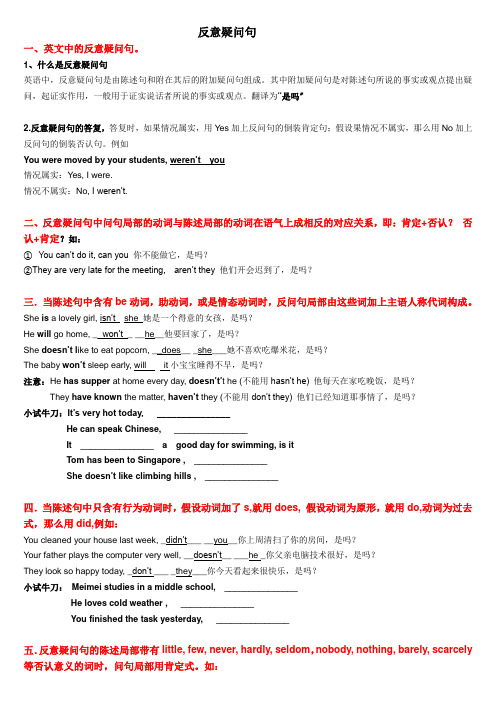
反意疑问句一、英文中的反意疑问句。
1、什么是反意疑问句英语中,反意疑问句是由陈述句和附在其后的附加疑问句组成。
其中附加疑问句是对陈述句所说的事实或观点提出疑问,起证实作用,一般用于证实说话者所说的事实或观点。
翻译为“是吗〞2.反意疑问句的答复,答复时,如果情况属实,用Yes加上反问句的倒装肯定句;假设果情况不属实,那么用No加上反问句的倒装否认句。
例如You were moved by your students, weren’t you情况属实:Yes, I were.情况不属实:No, I weren’t.二、反意疑问句中问句局部的动词与陈述局部的动词在语气上成相反的对应关系,即:肯定+否认?否认+肯定?如:①You can’t do it, can you 你不能做它,是吗?②They are very late for the meeting, aren’t they 他们开会迟到了,是吗?三.当陈述句中含有be动词,助动词,或是情态动词时,反问句局部由这些词加上主语人称代词构成。
She is a lovely girl, isn’t she 她是一个得意的女孩,是吗?He will go home, __won’t__ __he__他要回家了,是吗?She doesn’t l ike to eat popcorn, __does__ _she___她不喜欢吃爆米花,是吗?The baby won’t sleep early, will it小宝宝睡得不早,是吗?注意:He has supper at home every day,doesn’t’t he (不能用hasn’t he) 他每天在家吃晚饭,是吗?They have known the matter, haven’t they (不能用don’t they) 他们已经知道那事情了,是吗?小试牛刀:It’s very hot today, _______________He can speak Chinese, _______________It _______________ a good day for swimming, is itTom has been to Singapore , _______________She doesn’t like cl imbing hills , _______________四.当陈述句中只含有行为动词时,假设动词加了s,就用does, 假设动词为原形,就用do,动词为过去式,那么用did,例如:You cleaned your house last week, _didn’t___ __you__你上周清扫了你的房间,是吗?Your father plays the computer very well, __doesn’t__ ___he _你父亲电脑技术很好,是吗?They look so happy today, _don’t ___ _they___你今天看起来很快乐,是吗?小试牛刀:Meimei studies in a middle school, _______________He loves cold weather , _______________You finished the task yesterday, _______________五.反意疑问句的陈述局部带有little, few, never, hardly, seldom,nobody, nothing, barely, scarcely 等否认意义的词时,问句局部用肯定式。
- 1、下载文档前请自行甄别文档内容的完整性,平台不提供额外的编辑、内容补充、找答案等附加服务。
- 2、"仅部分预览"的文档,不可在线预览部分如存在完整性等问题,可反馈申请退款(可完整预览的文档不适用该条件!)。
- 3、如文档侵犯您的权益,请联系客服反馈,我们会尽快为您处理(人工客服工作时间:9:00-18:30)。
反意疑问句一、概念反义疑问句(The Disjunctive Question 即附加疑问句,反意疑问句是疑问句的一种,是对陈述句所说的事实或观点提出疑问,起证实作用,一般用于证实说话者所说的事实或观点。
反意疑问句是由陈述句和附在其后的附加疑问句组成。
结构有以下两种:1.陈述部分肯定式+疑问部分否定式2.陈述部分否定式+疑问部分肯定式即:前肯后否,前否后肯。
反义疑问部分用助动词或情态动词或be动词+名词或代词(主格。
如:They work hare, don’t they?Sh e was ill yesterday, wasn’t she?You didn’t go, did you?He can’t ride a bike, can he?二、反义疑问句的用法1. 陈述部分主语是I的肯定形式时,疑问部分要用aren’t I.如:I’m as tall as your sister,aren’t I?2. 陈述部分含有否定词或半否定词,以及含有由否定意义的词的反意疑问句当陈述部分有never,seldom, hardly,few,little,barely, scarcely, nothing, nobody 等否定词或半否定词时,反意疑问部分用肯定形式。
否定前缀不能视为否定词,其反意疑问句仍用否定形式。
如: There are few apples in the basket, are there?He can hardly swim, can he?They seldom come late, do they?It is impossible, isn't it?He is not unkind to his classmates, is he?3、含有宾语从句的反意疑问句当陈述部分是一个(带that引导宾语从句的主从复合句时,附加疑问句的主谓要和主句的主谓保持对应关系。
但是,当陈述部分的主语是I am sure ,I am afraid, I suppose, I think, I believe, I imagine, I expect等结构时,附加疑问句的主语和谓语要和宾语从句的主语和谓语保持一致关系。
而且要注意到否定的转移问题。
如:I don't think he is bright, is he?We believe she can do it better, can't she?I think chickens can swim , can’t they ?I think Lucy is a good girl , isn’t she ?I don’t think you are a student , are you ?4.祈使句的反意疑问句祈使句后加反意疑问句,不表示反意,而表示一种语气。
其结构为:否定祈使句+ will you?肯定祈使句+ will / won’t you?省去主语的祈使句的反意疑问句,疑问部分用will you。
Let's 开头的祈使句,后用shall we?Let us 开头的祈使句,后用will you?如:Let's go and listen to the music, shall we?Let us wait for you in the reading-room, will you ?Let’s go out for a walk, shall we?Let us go our for a walk, will you?Turn on the radio, will you?Don't do that again, will you?Go with me, will you / won't you ?5. 陈述部分含有used to和ought to的反意疑问句陈述部分含有used to 时,疑问部分用didn't +主语或 usedn't +主语。
陈述部分含有ought to 时,疑问部分用shouldn't / oughtn't +主语。
如:He ought to know what to do, oughtn't he? / shouldn't he?He used to take pictures there, didn't he? / usedn't he?6.陈述部分主语是不定代词everybody, anyone, somebody, nobody, no one等,疑问部分常用复数they,有时也用单数he。
如:Everyone knows the answer, don't they? (does he?Nobody knows about it, do they? (does he?7.带情态动词dare或need的反意疑问句,疑问部分常用 need (dare +主语。
如:We need not do it again, need we ?He dare not say so, dare you?当dare, need 为实义动词时,疑问部分用助动词do/does + 主语。
如:She doesn't dare to go home alone, does she?8.陈述部分是"there be"结构的,疑问部分用be/情态动词/助动词+there?There is something wrong with your watch, isn't there?There will not be any trouble, will there?9.陈述部分有have to +v. (had to + v.,疑问部分常用don't +主语(didn't +主语。
如:We have to get there at eight tomorrow, don't we?10.当陈述部分主语为指物的不定代词everything ,something ,nothing等时,附加疑问部分主语用it (有时也用they。
如:Everyone knows the answer , don’t they ?Nothing here is important , is it ?11.陈述部分的主语是指示代词this ,that,不定式,动名词,或从句时,附加疑问部分的主语用it。
陈述部分的主语是指示代词those ,these时,附加疑问部分的主语用they。
如:To see is to believe ,isn’t it ?That is not important ,is it ?He must be in the lab ,isn’t he ?12.陈述部分含有must的反意疑问句1当must表示推测时:☆对现在情况的推测,反意疑问部分应用助动词(do/be一般现在时的适当形式。
若是现在进行时,反意疑问部分用现在进行时的适当形式。
若是there be 结构,反意疑问部分用isn’t / aren’t there ?如: He must be there , isn’t there ?He must be waiting outside , isn’t he ?There must be some students in the roo m, aren’t there ?☆对过去的推测,若陈述部分由must have done ,而且有表示过去的时间状语,反意疑问部分用didn’t ;若没有表示过去的时间状语,反意疑问部分用hasn’t/haven’t。
如: You must have studied English for four years, haven't you?He must have finished it yesterday, didn't he?2 当must作“必须”讲时,用needn’t; 当含有mustn’t 禁止,不允许时,用must /may。
如: You must go now, needn’t you?You mustn’t smoke here, must/may you?13. 陈述部分含有had better或would rather或 would like to +v 疑问句部分用hadn't you?或wouldn't +主语?或wouldn't +主语?You’d better come early, hadn’t you ?You’d rather work than play, wouldn’t you ?You'd like to go with me, wouldn't you?14.感叹句后面的反意疑问句,其动词要用现在式,而且通常用否定,其主语和感叹句的主语一致。
如:What a funny man,isn’t he ?15. 对反意疑问句的回答,无论陈述部分是肯定形式还是否定形式,英语中应答反义疑问句时只依据事实回答。
若事实是肯定的,就用yes;事实是否定的,就用no。
第一部分是否定句,其英语回答和汉语回答有区别。
如:☆You are going home, a ren’t you? 你回家,是不是?Yes, I am. 是的,我回家。
No, I am not. 不,我不回家。
☆Mike can’t swim, can he?Yes, he can. 不,他会游泳。
No, he can’t. 是的,他不会游泳☆They don’t work hard, do they?Yes, they do. 不,他们工作努力。
No, th ey don’t. 对,他们工作不努力。
即学即练:1. Your sister doesn’t like collect ing stamps, ____?A. do sheB. does sheC. likes sheD. doesn’t she2. I t’s a fine day. Let’s go swimming, ___?A.w on’t weB. will weC. don’t weD. shall we3. Jane helped him with his English, ___?A. did sheB. didn’t sheC. helped sheD. didn’t Jane4. The boy ought to be punished, _____?A. ought heB. oughtn’t heC. ought he toD. ought he not to5. There won’t be a ny concert this Saturday evening, ____?A. will there notB. is thereC. will thereD. will it6. I told them not everybody could do the work well, ____?A. didn’t IB. couldn’t heC. couldn’tD. did I7. Be sure to write to us, ___?A. will youB. aren’t youC. can youD. mustn’t you8. Don’t smoke in the reading-room, ___?A. do youB. will youC. can youD. could you9. He has hardly made any mistakes in his maths exam, ______he?A. hasn’tB. doesC. doesn’tD. has10. He seldom has lunch at school, ___?A. does heB. doesn’t heC. has heD. hasn’t he11. She never speaks to you in English, ____?A. does sheB. doesn’t sheC. can sheD. can’t she12. The Smiths used to live in London, ____?A. used they notB. didn’t theyC. usedn’t heD. didn’t he13. He was careless, ___?A. was heB. wasn’t heC. was he notD. did he14.What beautiful weather, ______?A. is itB. isn’t itC. won’t itD. doesn’t it Homework:1. I don’t think that the necklace is made of diamond, ________?A. do IB. do youC. isn’t itD. is it2. His wife had the carpets and the curtains cleaned, ________?A. hadn’tB. hadC. didn’t sheD. did she3. No one left here yesterday,________?A. didn’t theyB. did theyC. didn’t oneD. did one4. Birds rarely build nests in our garden,________?A. don’t theyB. do theyC. didn’t theyD. did they5. You must have been to the Great Wall,____________?A. mustn’t youB. haven’t yo uC. aren’t youD. m ust you6. Learning how to repair motors takes a long time,________?A. doesn’t itB. don’t theyC. does itD. do they7. They must have stayed at home last night,________?A. mustn’t theyB. haven’t theyC. didn’t theyD. must they8. Let’s start out early tomorrow morning,________?A. shall weB. will youC. do youD. can’t you9. There’s not much news in today’s newspaper,________?A. isn’t itB. is itC. isn’t thereD. is there10. They need our help badly at the moment,________?A. ne edn’t theyB. need theyC. don’t theyD. do they11. She is unfit for the position,________?A. is sheB. isn’t sheC. doesn’t sheD. does she12.She’s been a worker here for many years,________?A. isn’t sheB. is sheC. hasn’t sheD. has she13.Mother used to live in a poor village,____________?A. used sheB. usedn’t sheC. didn’t heD. did he14. You’d better go at once,________?A. wouldn’t youB. had youC. hadn’t youD. should you15.I am very interested in Mark Twain’s novels,________?A. aren’t IB. am not IC. aren’t youD. are you16. I'm sure dirty, ______?A. am IB. isn’t IC. aren’t ID. am not I17. That’s the sort of the book you want, ______? A. is it B. isn’t that B. was it C. is thatD. isn’t it D. weren’t we D. can they 18. The movie that we saw last week was quite interesting, ______? A. wasn’t it A. can any one A. will he A. has you A. won’t it A. is it 高考试题汇编:1 It is the first time that he has been to Australia, A isn’t he A could you A is he A did he A had B hasn’t he C isn’t it D hasn’t it ? D could we ? ?D mustn’t he 2 You and I could hardly work together , B couldn’t I C couldn’t we B isn’t he B should he B did C hadn’t C must he ? C. didn’t we 19. Anyone can join the club, ______?B. can’t any oneC. can’t they C. will they C. did she C. has it 20. Nobody will believe how difficult his work has been ______? B. won’t nobody B. hadn’t she B. will it B. isn’t itD. won’t they D. didn’t she 21. The teacher had a talk with you, ______? 22. Something’ll have to be done about the air pollution, ______? D. does it D. doesn’t it 23. What a fine day, ___? C. does it 3 He must be helping the old man to water the flowers, 4 He had no idea of what he could say in answer to the question, C didn’t he D shouldn’t he5 Sarah had her washing mac hine repaired the day before yesterday , D didn’t ? C aren’t ID didn’t she ? 6 I’m sure you’d rather she went to school by bus , A hadn’t you B wouldn’t you she? 7 These trees must have been planted three years ago , A weren’t they B mustn’t they C didn’t they D haven’t they 6即学即练答案:1-5 .BDBBC 6-14. A ABDAABBB homework 参考答案 1-5 DCBBB 6-10 ACADA 高考试题汇编:CDBADBA 11-15 BCBCA 16-20 CDACC 21-23 DAB 7。
